One of the interesting things about going through the film releases of years long ago, is discovering what were the top box office draws. Compared to today’s dominance of the blockbusters, it’s refreshing to see a class film like Godfather was the number one film of the year, almost doubling the takings of the only blockbuster style movie on the list The Poseidon Adventure which itself helped kick off the 70’s fad of disaster movies. (Incidentally both these films were highly considered to be including in my three films choices for this year).
The rest of the list is quite fascinating. Amongst a few crowd pleasing comedies (Everything You Wanted to Know About Sex and What’s Up Doc,) we had a modern day musical (Cabaret), a gritty crime movie (The Getaway) and incredibly a hard core porn movie in Deep Throat. Interestingly, in an era where Blaxplotation was still going strong, two movies made it into the top 10 that were predominantly black casts. Lady Sings the Blues, was a biopic on Billie Holiday starring Diana Ross while Sounder was based around a black family trying to survive in the Great Depression. Commercial and critical successes, it’s curious that decades later there is an inequity with regards race in cinema.
One of my three choices for 1972 also made it into the top ten, a film that had a profound effect on my life, if only because it put me off camping for life. Which is a good thing.
Deliverance (director: John Boorman)

A nice canoeing trip through the American backwoods turns to horror when two of the four run afoul of a couple of Hillbillies. Is Hillbillies an offensive term? Oh well.
Almost fifty years on, Deliverance still holds the power to disturb and terrify audiences. With an unsettling tension that builds from the very beginning, this tale of four business men taking a canoeing trip in the remote backwoods of Georgia has a depth that goes beyond mere scares. So heavy on themes is it that show it to a group of viewers for the first time and you’ll initially have a range of interpretations as to what the film is actually about.
At it’s simplest level, Deliverance is based on a range of conflicts. Like with any expedition there is the simple narrative of man vs nature, the need for the rapid rivers to be conquered, the wilderness to be tamed. Yet as perilous as their canoe trip is, the woods and rivers are majestically beautiful, the real darkness and danger coming from the conflicts between men.
The tensions between small town folks and big city residents is evident from the opening scene, the four taking a stop at a small village with a gas station and mixing uneasily with the locals, who it’s implied are inbred. There’s mocking going on from both sides, with the sole bonding is when the groups musician Drew gets into a banjo duel with a silent boy. It’s a enjoyable scene, the briefly brings everyone together in enjoying the music, but when it ends there is an ominous refusal of the boy to shake Drew’s hand. Later when the quartet set off down the river, Drew spots the boy again watching them as they pass under a bridge yet spookily fails once again to respond in any way.
The small town vs big city theme goes beyond the personal prejudices. The reason that group leader Lewis (played in breakout role by Burt Reynolds) has pushed for the trip is that the river and valley they are traversing is soon to be flooded to make way for a new damn. The local’s lives presumably to be uprooted for the benefit of the city of Atlanta (from where the four reside), where the power of the damn will be directed. There is a sense of the big cities abusing the smaller communities, mirroring what happened to the Native Americans at the hands of settlers. Not only is their land used for the needs of big cities, it’s also enjoyed as recreation for the four as essentially tourists, but also as a way to reclaim their masculinity that they have surrendered by turning their own nature over to comfortable city life.
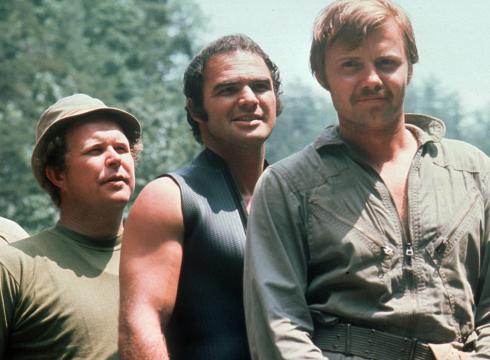
Masculinity, or the loss of it, is a key theme throughout the film. Reynolds as Lewis is the ultimate alpha male, proficient as a hunter (armed with a bow and arrow a throwback to tougher times) and able to survive comfortably in the wilderness, his macho aura makes him the unquestionable leader. By comparison the rest of the group show traits that traditionally mean they are less masculine. Drew pursues the arts as symbolised by his banjo, Bobby (another defining role for Ned Beatty) has a pudgy build, the less physically fit and struggles to grasp canoeing, while Jon Voight as Ed is a comfortable family man but clearly looks up to Lewis. Later in the film, where you expect Lewis to be the hero and savior he instead becomes injured and it’s left to Ed to emulate the injured alpha male and take charge.
The most notorious moment in Deliverance is of course the rape scene, where Ed and Bobby are separated from the others and take a moment to land their canoes. They encounter two armed “mountain men,” who mock the pair, take them prisoner and start an uncomfortable to watch process of humiliation where they force Bobby to strip and with the now infamous “squeal piggy,” line make him act like a pig before raping him. It’s a long, distressing scene, made especially horrifying by Ned Beatty authentically look terrified and William Mckinney’s as the attacker horribly relishing the role as tormentor and having the roles of power switched over the city dweller.
As horrible and as sickening as it is to watch, it’s telling that this is one of the most famous rape scenes in cinema. The fact that it is a male on male rape seems to give it a notoriety above the many depictions of women being raped throughout the history of film. It’s remembered before such horrifying scenes such as Jodie Foster being violently gang raped in The Accused, or Geena Davis in Thelma and Louise. It’s power to shock could be that it’s a threat that seems alien to male audiences and characters. Despite being out in the wilderness and in an unfamiliar environment, the two men feel safe to do as they please and the possibility of sexual assault is never considered a possibility.
In an excellent examination of the scene on Collider, Brian Formo states that what shocks male audiences is also what women can relate to. That being spaces and places being denied to them. Women are told not to go out alone at night, to avoid certain areas with the threat of rape almost an accepted part of life. https://collider.com/deliverance-rape-scene-explained/#images
A similar experience seems about to be inflicted on Jon Voight’s Ed, when in one of the most “oh Thank God,” moments that I’ve ever felt watching a film (I think I was about 14 when I first saw Deliverance), he spots Burt Reynolds in the distance already taking aim with his bow and arrow, fulfilling his macho role as coming to the rescue and killing the attacker that raped Bobby.
As already stated, in a shock to the savior narrative Reynolds later suffers a leg injury in the most ambiguous of circumstances. After arguing about what to do with the body of Bobby’s attacker, they decide to avoid a local trial and keep Bobby’s rape secret to bury the body. Incidentally this rape shame on the part of Bobby manifested in Ned Beatty’s real life, as to this day he is mocked by people repeating the “Squeal piggy, squeal,” to him and at the time he feared the scene could ruin his career. However Drew is against the move and is clearly distressed, later collapsing into the river without a life jacket, causing him to drown and the canoes to crash and Lewis to be injured.
There is a confusion over what happened to Drew, as it seems clear to the audience that the guilt and pressure of what has happened has either caused him to collapse or to try to commit suicide. However the sight of a man with a gun (assumed to be the other mountain man who escaped) on the cliffs leads them to assume Drew was shot, as if it is impossible to accept that Drew’s death and Lewis’s injury was of their own making. When Drew’s body is later discovered there is no bullet wound discovered, likewise when Ed goes on the hunt and kills the gunman it’s unclear if he was the other mountain man or just an innocent in the wrong place at the wrong time. Later when back safely and speaking to a Sheriff, it’s mentioned that his brother in law has been missing for a few days while on a hunting trip in the same area the quartet were passing through. It’s implicated this was the man Ed shot on the cliffs, but it’s not clear if the brother in law was also one of the original attackers. It’s curious that he states only one man is missing, not two.
As I stated before there is lots to read into Deliverance. As well as the conflicts, questions of masculine identity film could also be seen as a Vietnam trauma movie. Deliverance was released on the back end of American involvement in Vietnam and it was now clear victory was never going to happen. The story of a superior force arrogantly going into a territory it didn’t know or understand and being stalked and outwitted by poorer locals who could use the environment to their advantage mirrors the experience of the four canoeists.
Or maybe it’s just about horny rednecks and why you shouldn’t go camping?

Silent Running (director: Douglas Trumbull)

The last hope to keep alive the Earth’s forests lies in a project to keep the vegetation alive in deep space. When an astronaut is ordered to abandon the experiment he goes on the run, intent on saving the last surviving forest.
Weirdly, Silent Running is one of the first films that I can recall seeing on TV. I can’t be sure how much if it I watched or how much I understood, however I was old enough to be aware they were in space but couldn’t understand why the boxes had feet and were walking around, so robots were beyond my comprehension at that point. That said, I do remember being upset that one of those walking boxes got killed.
Unbeknownst to my very, very young self, I was watching one of the great sci fi movies, one that top critic Mark Kermode calls the “second greatest film of all time.” Science fiction in the early 70’s had a very different vibe as to what they would become in a few years time when Star Wars took it in the direction of space opera (and this isn’t a dig at the Wars as I’m a love time lover of the original trilogy). Science Fiction movies were generally about something, as canny writers realised they could highlight political and social issues by wrapping them up in a futuristic and entertaining setting.
In Silent Running it’s the environment that takes centre stage, as in the future (well technically our past) mankind has pretty much made the Earth uninhabitable for nature (although somehow the human race seems to be prospering) and forests and plant life are being preserved in deep space in giant greenhouse domes on giant space ships, set in the orbit of Saturn. Awaiting the day when the forests can be returned to Earth once again, Freeman Lowell tends the forests on one ship with such love and dedication he’s mocked and ostracised by his three younger crewmates.
When Earth orders the crews to abandon the project and destroy the forests so the ships can return to freight service, a distraught Freeman kills his crewmates and escapes with his ship and three droids to save the last ever forest dome.

Silent Running is fabulous science fiction, rooted in the hangover of sixties hippy beliefs and where the human story takes precedence over the actual realism of the science we’re expected to accept. Freeman takes his love of nature and idealism to the extremes, far happier to be amongst his plants and small animals than other humans and ultimately leads him to trade the lives of his three crewmates for the single remaining forest.
Ostracised as he makes himself from other people, the solitude he finds himself in still seems to effect him mentally. For company he reprograms his droids to be more human like and gives them the names Huey and Dewey (even naming a third droid that was lost early in the escape as Louie). While he teaches them successfully to garden, an attempt to play poker with them ends in failure and his frustration shows that he craves intelligent interaction. Sadly it’s hinted that this programming causes Huey to not obey an order to stay put and leads to Freeman crashing into him while driving the ship’s buggy.
Silent Running is a challenging film. You can have sympathy with Freeman and a righteous, noble cause, however this has to be balanced with his actions in killing the rest of his crew. Freeman himself can be hard to like at times, his rants about the state the world has become and the lack of beauty around while correct are delivered in such a condescending manner to his crew, that there is an irritating superiority that he exudes. However these flaws in his character make him way more human than the cold detachment of the characters in say 2001, a film which Silent Running was often negatively compared against.
There is a warmth in Silent Running that 2001 solely lacks. As functional as they appear, the droids have a lovely charm about them, years before R2-D2 warmed audiences hearts. Indeed the final shot of the film with Dewey tending to the garden with a watering can only be described as lovely. At it’s heart, Silent Running is a positive movie about trying to retain some beauty and simplicity amongst the vast juggernaut of technology.
It’s a sad, sometimes tragic movie, but one that puts the needs of a human at the forefront in a scientific world.
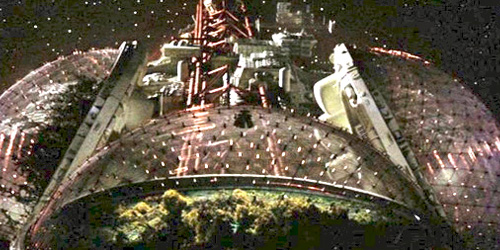
Conquest of the Planet of the Apes (director: J Lee Thompson)
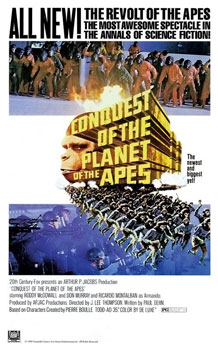
The Planet of the Apes saga comes full circle as the son of Cornelius and Zira leads a revolt of abused and enslaved apes against a fascist system.
If placing environmental issues into a science fiction movie could be considered subversive, how about sneaking in a plot about an oppressed race rising up to violently revolt against a racist society?
Conquest of the Planet of the Apes is the fourth instalment of the original Planet of the Apes saga, which for me is one of the most underrated sagas of all time. The previous film, Escape from the Planet of the Apes, had ended with a cliff hanger of sorts, following the deaths of Cornelius and Zira (who’d time travelled from the future post apocalyptic world of the apes to 70’s America, yeah it’s complicated), gunned down by the authorities in a truly tragic scene. However the ending revealed that their son had survived and was hidden in a travelling circus.
Conquest takes place almost 20 years later, with the grown up son (Caeser) played by Malcolm McDowell who had played the characters father Cornelius in the previous films. In this future a virus has wiped out the dogs and cats population and to replace them apes have been trained to be domesticated and used as servants. American society has becoming a facist state, with the apes abused and tortured to ensure their obedience as a slave race.
While witnessing an ape messenger being beaten by police, Casear yells at them “Lousy, human bastards,” betraying that he can speak and forced to go into hiding as a regular ape in a training centre. There he sees the abuse inflicted on apes to train them and already angered by the mistreatment gives up on humanity when her learns his father figure the circus owner has died in police custody. Caesar starts to organise the apes, first with acts of protest and civil disobedience and eventually causing a revolt at the training centre and leads the freed apes on a riot to seize the city and overthrow the ruthless governor.
Caesar’s revolution brings the saga full circle, as it begins the apes eventual takeover of the Earth that we find in the original movie.

The early 1970’s had seen a wave of riots and breakouts of civil unrest across America. While a film of a racial revolution overthrowing authorities would be a tough sell in a Hollywood movie, a Sci-Fi fantasy with a revolt by enslaved apes is something that could be subversively sneaked through. Being in a futuristic genre gave the creators a lot more freedom to up the violence in Caeser’s revolution, allowing for sights of humans and riot police being beaten to death by the rampaging apes.
Caeser is a great contrast to his benevolent and lovable parents. Bought up having to hide his identity and seeing the oppression his race has to endure, sows the seeds of anger and hatred towards the human rulers. When the revolution comes he leads it ruthlessly and without mercy, yet after witnessing the abuse and cruelty the slave apes are put through makes his cause a sympathetic and just one.
While the film was not well received, I think it may be my favourite in the franchise due to it embracing the concept of a violent revolution so fully. The riot scenes are brutal and frenetic, putting you right in the middle of the action with frightening authenticity. It’s visually stunning, by setting it at night it empathises the fires caused by the riot polices flame throwers, and it made clear that the humans are being killed as the apes take over. It finishes with a passionate but frightening speech from Caesar, who with the Governor captured and at his mercy,proclaims that apes everywhere will rise up and kill and enslave their former human masters.
“Where there is fire, there is smoke. And in that smoke, from this day forward, my people will crouch, and conspire, and plot, and plan for the inevitable day of man’s downfall. The day when he finally and self-destructively turns his weapons against his own kind. The day of the writing in the sky, when your cities lie buried under radioactive rubble! When the sea is a dead sea, and the land is a wasteland out of which I will lead my people from their captivity! And we shall build our own cities, in which there will be no place for humans except to serve our ends! And we shall found our own armies, our own religion, our own dynasty! And that day is upon you NOW!“
As graphic and uncompromising as the revolution is, the original ending was deemed to go too far and too bleak. Originally when Ceaser’s revolution takes control of the city, the Governor is brought out for execution despite the pleas of Macdonald, the Governor’s aide (the only person in authority with empathy for Caesar, as being black he points out he is the descendent of slaves). After Caesar delivers his speech he allows the mob of apes to pound the Governor to death with the butts of their rifles. The film ends on a close up of a determined Caesar, his face glowing from the flames of the riot and the triumphant screams of the apes all around.
As chillingly effective as this ending was it was deemed a step too far on test screenings and a more optimistic outcome was asked for. Although there was no budget to film a new ending, McDowell was brought in to record an audio that lengthened Caesar’s speech. In this reworked ending, after delivering his first speech he now spares the Governor’s life and the apes put down their rifles. He continues his speech by stating that the apes will put aside their vengeance and will rule the humans with the compassion and humanity that they were denied. The speech is delivered with a close up on Caesar’s eyes as they are unable to show his mouth uttering the words.
The original speech was made available as a DVD extra and having watched both I can’t decide which version I like better. The theatrical ending is of course more optimistic and makes Caesar a more heroic figure, with the irony that although they are not human, they are more humane. However I really like the ballsy, no compromise of the original ending and it’s bleak ending is more in keeping with 70’s cinema as I know it.
Conquest was followed up with The Battle for the Planet of the Apes, which picks up Caesar’s new society after a nuclear apocalypse had devastated much of the Earth. It’s a cheap and disappointing end to the five film saga, although it does bring a satisfying conclusion in that humans and apes are attempting to live in peace together.
As a whole I prefer the original Apes saga (the first four films at least), to the modern apes trilogy. The films are varied in style and tone, have a mix of humour , social commentary and satire throughout the series and while no where as realistic or impressive as the later CGI apes, I find there is more warmth and character in McDowell and co in monkey suits.

WTF? Night of the Lepus
I first saw Night of the Lepus late one night hiding away on BBC-2. I had no idea of the premise, and was rewarded by a batshit crazy B-Movie story line. You see in this monster movie, a group of scientists are experimenting on rabbits in the hopes of controlling the rampant bunny population.
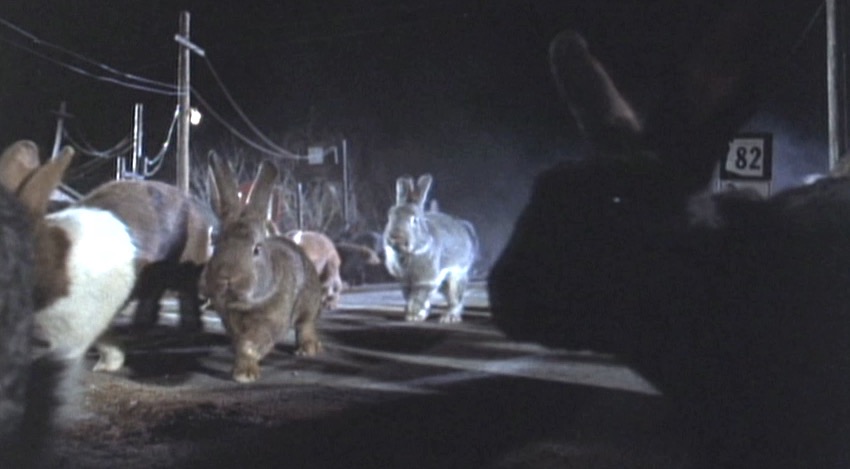

Of course it all goes wrong. One of the little rabbits gets loose and infects the whole bunny population, causing them to grow massive in size and more bizarrely become murderous meat eaters.
This film sounds like an Airplane style spoof, but it’s amazingly played completely straight. Which actually makes the film way more funny.
The sight of rampaging bunnies storming across ranches and going after humans is bonkers and hilarious. What’s more, the rabbits are still darn cute.
The film also answers the question, what did Deforest Kelley do after Star Trek.

I’ll be back some time to do 1971 soon. In the meantime, stay safe and look out for others as well as yourselves.
Dazza


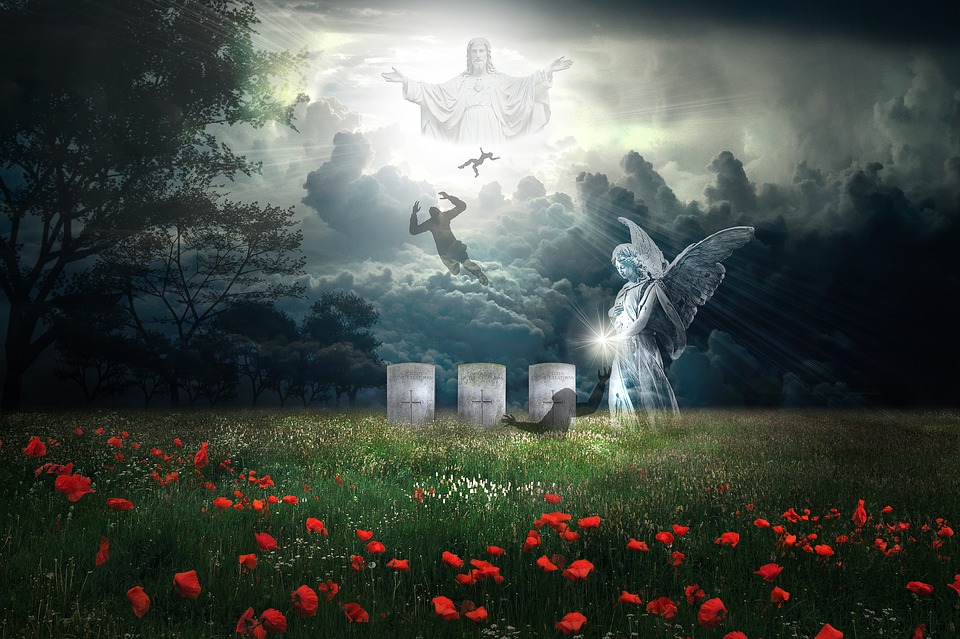



What’s up?
I found this article very interesting…please read!
Do you remember the blockbuster hit film The Matrix that was released in 1999? You may not know this, but it has deep spiritual implications concerning the times we are living in and Bible prophecy.
It tells a story of how these “agents” are trying to turn us into machines. We are closer then ever before for this to become a reality when they cause us to receive an implantable microchip in our body during a time when physical money will be no more.
You may have seen on NBC news concerning the implantable RFID microchip that some people are getting put in their hand to make purchases, but did you know this microchip matches perfectly with prophecy in the Bible?
“He (the false prophet who deceives many by his miracles) causes all, both small and great, rich and poor, free and slave, to receive a mark on their right hand or on their foreheads, and that no one may buy or sell except one who has the mark or the name of the beast, or the number of his name…
You also may have heard of the legendary number “666” that people have been speculating for possibly thousands of years on what it actually means. This article shares something I haven’t seen before, and I don’t think there could be any better explanation for what it means to calculate 666. This is no hoax. Very fascinating stuff!
…Here is wisdom. Let him who has understanding calculate the number of the beast, for it is the number of a man: His number is 666″ (Revelation 13:16-18 NKJV).
To see all the details showing why the Bible foretold of all these things, check out this article!
Article: https://biblewoke.com/rfid-mark-of-the-beast-666-revealed
GOD is sending out His end time warning:
“Then a third angel followed them, saying with a loud voice, ‘If anyone worships the beast and his image, and receives his mark on his forehead or on his hand, he himself shall also drink of the wine of the wrath of God, which is poured out full strength into the cup of His indignation. He shall be tormented with fire and brimstone in the presence of the holy angels and in the presence of the Lamb. And the smoke of their torment ascends forever and ever; and they have no rest day or night, who worship the beast and his image, and whoever receives the mark of his name'” (Revelation 14:9-11).
In the Islamic religion they have man called the Mahdi who is known as their messiah of whom they are waiting to take the stage. There are many testimonies from people online who believe this man will be Barack Obama who is to be the biblical Antichrist based off dreams they have received. I myself have had strange dreams about him like no other person. So much so that I decided to share this information.
He came on stage claiming to be a Christian with no affiliation to the Muslim faith…
“In our lives, Michelle and I have been strengthened by our Christian faith. But there have been times where my faith has been questioned — by people who don’t know me — or they’ve said that I adhere to a different religion, as if that were somehow a bad thing,” – Barack Obama
…but was later revealed by his own family members that he indeed is a devout Muslim.
So what’s in the name? The meaning of someones name can say a lot about a person. God throughout history has given names to people that have a specific meaning tied to their lives. How about the name Barack Obama? Let us take a look at what may be hiding beneath the surface…
“And He (Jesus) said to them (His disciples), ‘I saw Satan fall like lightning from heaven'” (Luke 10:18).
In the Hebrew language we can uncover the meaning behind the name Barack Obama.
Barack, also transliterated as Baraq, in Hebrew is: lightning
baraq – Biblical definition:
From Strongs H1299; lightning; by analogy a gleam; concretely a flashing sword: – bright, glitter (-ing, sword), lightning. (Strongs Hebrew word H1300 baraq baw-rawk’)
Barak ‘O’bamah, The use of bamah is used to refer to the “heights” of Heaven.
bamah – Biblical definition:
From an unused root (meaning to be high); an elevation: – height, high place, wave. (Strongs Hebrew word H1116 bamah baw-maw’)
The day following the election of Barack Obama (11/04/08), the winning pick 3 lotto numbers in Illinois (Obama’s home state) for 11/5/08 were 666.
Obama was a U.S. senator for Illinois, and his zip code was 60606.
Seek Jesus while He may be found…repent, confess and forsake your sins and trust in the savior! Jesus says we must be born again by His Holy Spirit to enter the kingdom of God…God bless!